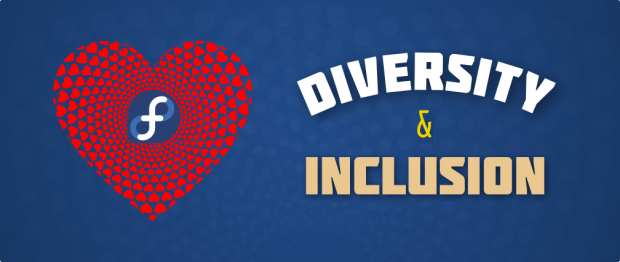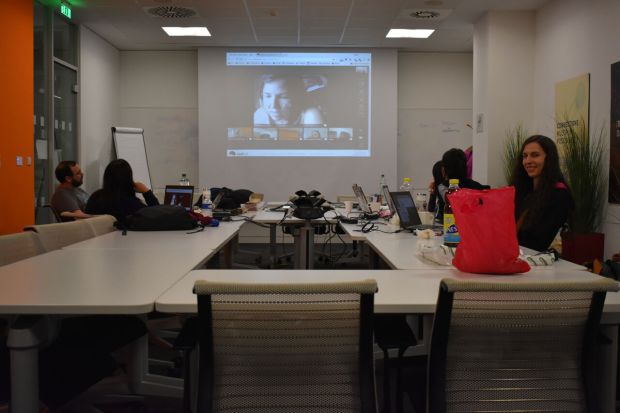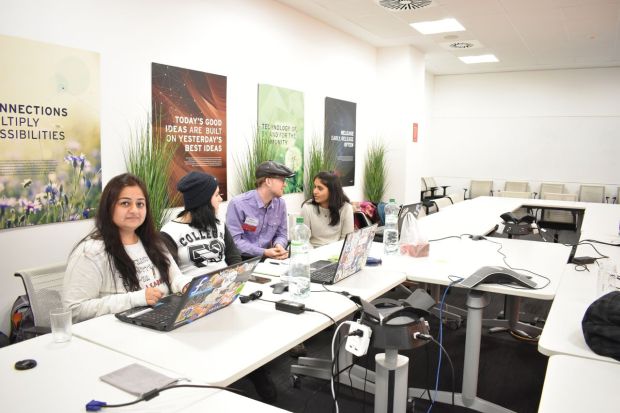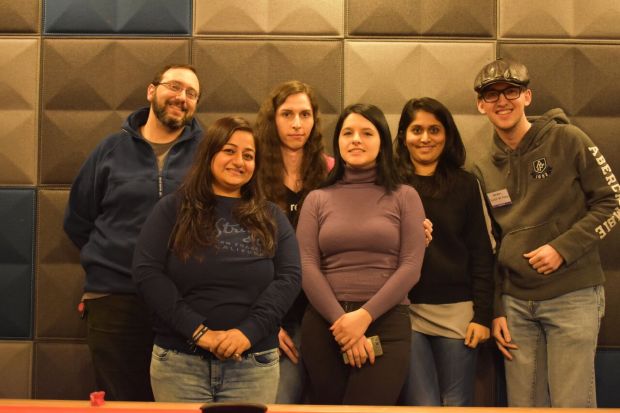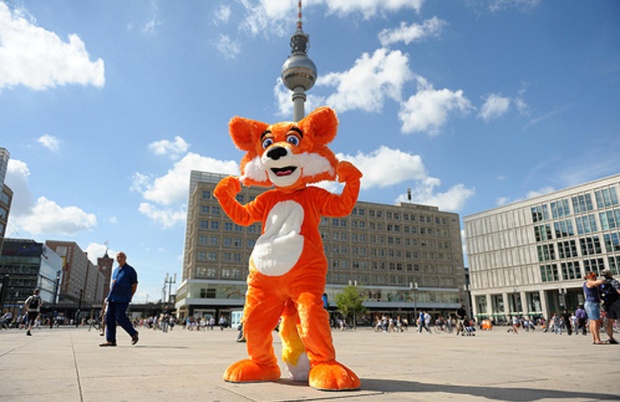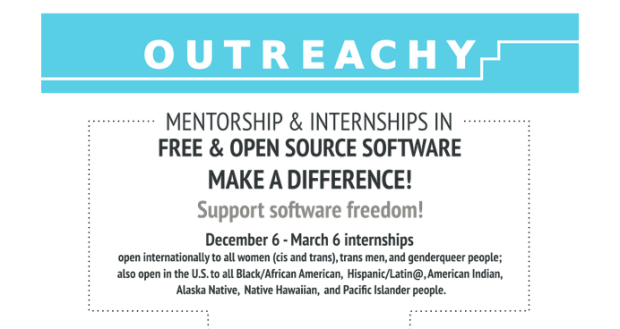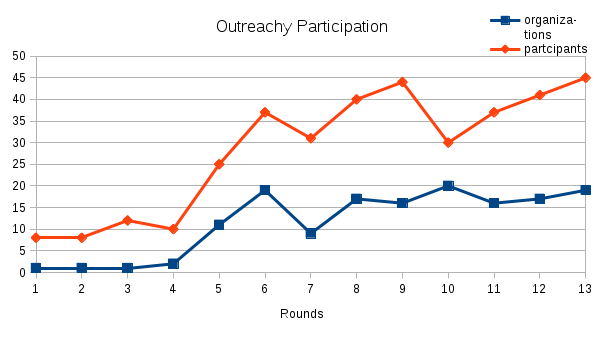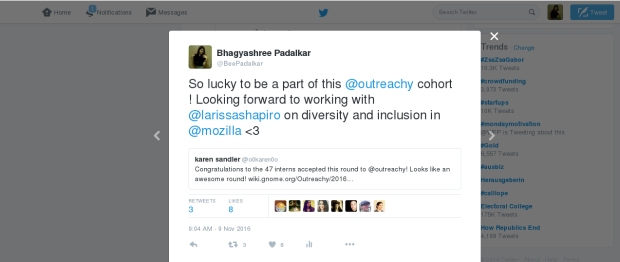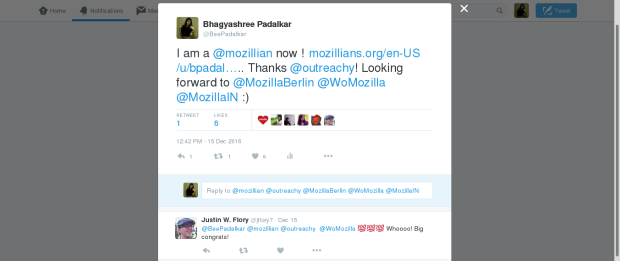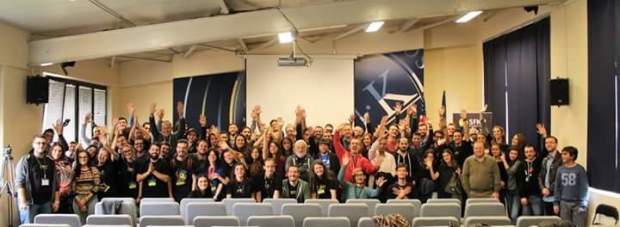LinuxCon EU 2016 took place from Oct 4-6 in Berlin, Germany. LinuxCon is one of the biggest FOSS conference where developers, sys admins, architects and all levels of technical talent gather together under one roof for three days. Since I am currently living in Berlin, there was no way I could miss this conference – even though the tickets for attending the full conference were around 1000 euros and way out of my league as a student researcher. Thankfully, I was awarded the Minority scholarship by Linux Foundation to attend the conference (including the talks and workshops) – and also the Women in Open Source Lunch and some other evening events ! I was also a part of the Fedora ‘crew’ at LinuxCon and helping out with Fedora Booth !
Fedora at LinuxCon
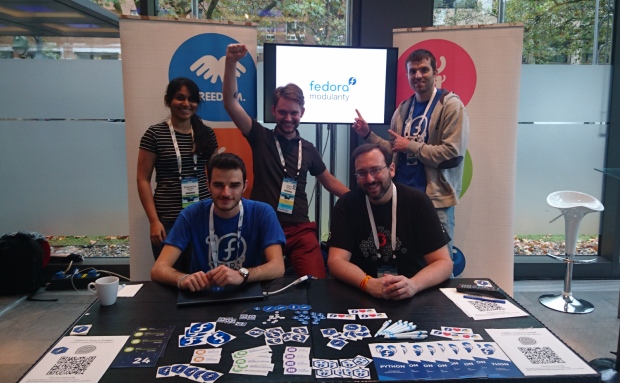
Our Fedora booth ‘crew’ consisted mainly of three members – Jiri, Zach and me. Jiri and Zach are Fedora Ambassadors for EMEA region. But we were not the only booth with some Fedora content. Red Hat had a booth on the other side of the room. People could see Fedora and meet Fedora contributors there too. We were also joined by RedHat ‘gang’ involved in Fedora sometimes – mostly Adam (who currently works on Fedora Modularity, but is one of the lead developers and designers of the awesome Fedora Developer Portal) and also Brain Exelbird (Bex) – the Fedora Community Action and Impact Co-ordinator (yes, it’s F-CAIC or F-CAKE depending on how much you like desserts 😛 ) . You can know more about the Fedora impact at LinuxCon + ContainerCon EU 2016 by reading Jiri’s report on LinuxCon EU 2016 on Fedora Community Blog here.
Impact of LinuxCon on Fedora
While we were able to create a special Fedora badge for LinuxCon EU attendees to gauge the impact of the event, out of the 16 times it was awarded , there was only one new contributor ganto and Jiri has talked about the reasons why this happened in his post on Fedora Community Blog.
That being said, there were many people interested in using and/or contributing to Fedora and we were able to point them in the right direction. If you are reading this post and are interested in contributing to Fedora Project but don’t know how to start ? or are confused about which team to join ? – check out Fedora website to help new contributors. If you still have any queries, you can contact one of us (or definitely me).
There were a few common troublepoints for us at the Fedora booth at LinuxCon –
- There were quite a few people who felt the Fedora logo looked similar to Facebook.
- Some people couldn’t understand that it was Fedora booth as the Fedora logo was at the bottom of the banners. (I think some people were hesitant in approaching the booth because of this too)
- People were interested in installing Fedora but couldn’t take the workstation DVDs as their computers had no CD drives. I am not sure how many of those actually went home and downloaded Fedora.
- Many were doubtful as why Fedora had a booth separate from RedHat ? (Fedora booth was organized by the community and not Red Hat) and if so, why was it so away ? (Fedora and RedHat booths were at opposite ends of the hall. )
All of us had discussions during LinuxCon about how to improve visibility of Fedora at such events and quite a few interesting points came up including creating swag for interested contributors. Adam even worked on a design for a new Fedora banner with increased visibility. There were also quite a few technical discussions about ongoing developments in Fedora OS, modularity in Fedora and how we were working on it and so on. We also discussed amongst ourselves about different issues affecting Fedora Community including diversity and inclusion in Fedora community.
We ended the conference by going out for dinner at an Indian restaurant with Red Hat ‘gang’ where I ended up having ‘Vindaloo’ for the first time – even though I am an Indian ! 😛
My Takeaways as a Fedora contributor
On a personal note, I feel that conferences are not only a great way to help onboard new users and/or contributors but also a great learning opportunity for existing contributors about different parts of the project, meeting different community members, raising questions about a variety of issues related to the project, learning why some things are taking place in a certain way and sometimes even having a suggestion or idea which could potentially impact the system for better. In case of projects like Fedora where most of the contributions are virtual, it definitely ‘humanizes’ the project i.e. for me, I have began to understand that barriers for entry in FOSS are not unnecessarily high and I don’t have to be an expert in the area I contribute or I don’t need to have loads of free time – all I need is an avid interest and the rest will be taken care of !
LinuxCon EU talks and events

I didn’t know anything about containers before attending LinuxCon + ContainerCon but after attending some elementary talks on containers, I can definitely say I know the basics and can deploy a kubernetes module 😛
Apart from container-related talks, some other talks I found pretty interesting were
‘Gender-diversity analysis of technical contributions’ by dizquierdo from Bitergia. The talk combined my two interests – metrics and diversity and really helps make sense of the diversity issue in FOSS by supporting it with numbers. I wanted to meet Daniel after the talk to discuss about the diversity metrics, the work Bitergia is doing and it’s similarity with my work involving community metrics in Fedora (on contributor engagement, impact of attending events on contributors and community, improving contributor retention rates and diversity related metrics) but somehow between being at Fedora booth and attending talks, I could never find him.
So @dizquierdo, if you read this – however unlikely that is, I am a fan of Bitergia and would love to discuss more about metrics Bitergia compiles and analyses 🙂 (Slides for the talk are
here )
The talk on ‘FOSS Involvement of Google’ was also very interesting. I always knew Google had some Open Source projects and even used them but never knew that Google actually contributed to LinuxKernel. (Slides for the talk are
here)
Other talks which I found interesting were ‘Outreachy Linux Kernel Internship Report’ by Julia Lawall and other past Outreachy interns, ‘Corporate Trends in Open Source Engagement’ by Nithya Ruff, ‘IF YOU BUILD IT,THEY WON’T COME’ about non-technical aspects of FOSS projects by Ruth Suehle, ‘Graphite@Scale:How to store million metrics per second’ by Vladimir Smirnov of Booking.com . I couldn’t attend all of these talks but the slides were informative and I hope the videos are uploaded soon.
You can find the slides for all talks
here. Networking is tough ! Or maybe, it’s all about curiousity
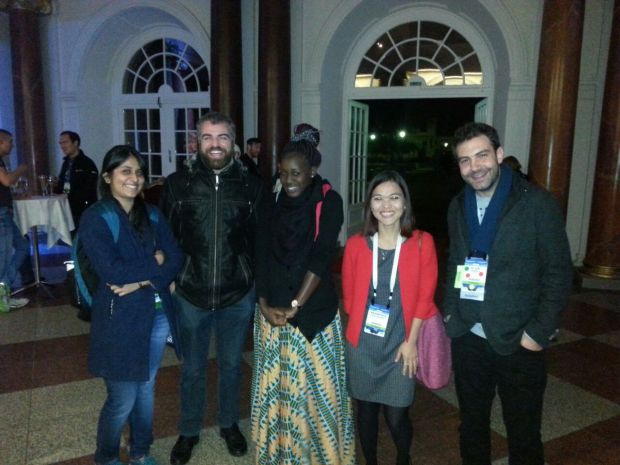
As with all conferences, LinuxCon is a great opportunity for networking. However, I am a dummy at ‘networking’ since I recently graduated from my college in India where networking was not in anybody’s vocabulary. While I did visit booths, collected swag, talked about job opportunities – I wasn’t able to forge any contacts. We had a networking event in evening at Charlottenberg Palace and I remember everybody talking and laughing with glasses of wine and me wondering about the right question to start a conversation. While I did manage to talk with different people by the end of the evening, I realised I forged contacts when I was actually interested and curious about the product and wasn’t just asking someone for jobs. I was able to talk to people working in different FOSS organizations, know about their experiences and the products they were working on, how they used data analytics and Machine Learning – and sometimes walk away with job opportunities – all because I was curious and interested in their organization, and not just looking for a job ! It was tougher to initiate personal contact at booths though since booths had multiple people at times and personal contacts were hard to make. However, I was able to learn a lot about the ongoing projects at organizations, the opportunities and work environment at the booths. I was especially fascinated by a Unity game made by a Business Administration intern at HP during his summer internship – it just shows the diversity of opportunities you have at such workplaces. I also took part in some raffle contents, but never won anything! (Zach won a game though – like Legos, but not as interesting – is all I could understand about it 😛 )
Research Opportunities and Scholarships
Since I am interested in pursuing a PhD, I was interested in exploring research collaborations with FOSS projects and organizations – via a research project with mentor in the organization, collecting data from the organization, scholarships or support for FOSS related research work or joint PhD programs with research institution and the FOSS organization but couldn’t find much opportunities in this area. Afaik, Red Hat Brno sometimes has students working for thesis with them but it is generally OS-development related and not for data analytics. Ping me, if you know something !
Marketing
Sponsors for conferences at LinuxCon spend a lot of money for the booths, the swag and goodies at the booth (giving away T-Shirts at booths was common and some even had USBs and power banks), and many more including the expenses of the employees who represent the organization at the event. The expenses are huge, but do organizations get returns for what they spent ? The rational answer is that they do, otherwise why else would they come back ? But isn’t there a better of evaluating the impact at these events ? Bex and I had a long discussion about the different costs a organization like Red Hat incurs for being a part of LinuxCon but I would love to know more about how they measure the impact they have at a particular event.
Women in Open Source
Diversity and Inclusion in FOSS is one of the topics very close to my heart and I was extremely excited to be given an opportunity to be a part of the Women in Open Source Lunch at LinuxCon. Since I am also a part of Diversity Team at Fedora and involved with FOSSWave (an outreach initiative for new FOSS contributors in India), I felt this would be a great learning opportunity where I could apply the learnings directly towards the benefit of the FOSS community.
Lunch and Discussion, Meeting Role models

Over lunch, girls and women from different phases of their career and involved with different FOSS projects discussed about different issues related to diversity and inclusion in FOSS communities. The 50 or so group of women were divided around 8-10 tables with each table discussing a particular issue(question). At the end of the lunch, a moderator from each table spoke in brief about the ideas or solutions they had come up regarding the issue.The questions we discussed ranged from ‘What diversity or inclusivity programs do you see working and how can FOSS communities adopt those ? Programs from software, propreitery companies, FOSS companies etc‘(which was my table), ‘How can women support other women in community?‘ to ‘What does safety mean in online communities? What can we do to ensure communities are safe ?‘
I found the format especially helpful and efficient when conducting such a diversity related panel/QA session at conferences. I have compiled a list of the topics we discussed and the solutions other women came up with here which you can edit with your own comments on the issue.
My key takeaways from the discussion were :
- Start young – start breaking down the stereotypes in high school. The root of the problem starts in high schools and it is easier to tackle at the earliest stage. Also, when doing this , involve not just students but also parents and teachers as they make up the environment and community which shapes the individuals perceptions !
- Start small ! Speak up! – If you see something wrong – don’t ignore or let it slide even if it is not technically harmful. Small disruptions lead to big changes. Share your success stories, mentor someone from your community – every small bit counts.
- Provide role models and mentors – Many succesful programs involve mentorship. Helps ease the transition and feels good to have a support system and know people who have done it, you don’t feel alone.
- We need a dedicated and active support channel for diversity and inclusion related issues across projects and communities.
During the lunch, I was also able to meet a lot of my role models from FOSS communites and learnt about the experiences of some awesome women in Open Source like Nithya Ruff of Western Digital, Julia Lawall of Linux Kernal and many past Outreachy interns as well as FOSS contributors.
Along with the awesome lunch, goodies by Sandisk (I desperately needed a pen drive, thank you!) and beautiful birds-eye view of Berlin from 13th floor of the hotel, the event also had some fun activities like raffle in the end – and surprisingly, I got lucky and won a Berlin Bear ! Yaay !
Diversity Survey, Talking to different organizations and people
There are multiple ongoing efforts across different FOSS projects and organizations to improve diversity and promote workplace inclusion for minority groups in their respective communities. However, these efforts are not consolidated and do not look towards analyzing the impact of those strategies – about what is working and what isn’t ! With this in mind, I have started a Diversity and Inclusion study (more details here) to get an overview of diversity and inclusion practices across different FOSS projects, communities or organizations and learn from their success and failures too and share it with other FOSS organizations and projects so that the same mistakes don’t get repeated again and again ! The study is still in it’s nascent stage and I am working on the shortcomings to better develop the study however, I talked to different people and organizations(representatives at Booths) to learn about their experiences and/or how their organization is working towards this. I learnt quite a few interesting things and if you would love to be a part of this study, please ping me so we can discuss more.
To sum it up, LinuxCon was an awesome learning experience, full of fun – I wish I could have attended more talks and talked to more people(especially those from Bitergia and Fitbit) – but I gained knowledge about a lot of new stuff like Containers, learnt about new FOSS projects and organizations, helped onboard some new contributors to Fedora and brainstormed about some community issues, gained a fresh perspective on diversity and inclusion in FOSS – all while collecting some awesome swag and a Berlin bear along the way !
